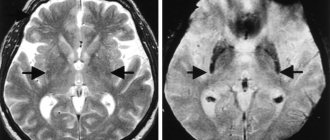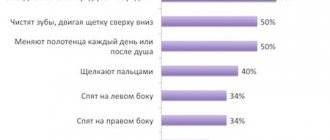Why is it harmful for children to watch TV and play on the computer? Is it normal for a child to wake up frequently at night? What to do if a child does not want to study? These and other questions are answered by a guest of the U-mama website, pediatric neurologist Anna Maleina, as part of a joint project between U-mama and MTS.
Let's figure out what symptoms the child needs to see a specialist and listen to the doctor's recommendations.
Anna Maleina sees young patients at the Moscow Medsi children's clinic, and also provides online consultations through the SmartMed* application.
What is SmartMed?
SmartMed is a smartphone application developed by MTS together with the federal network of Medsi clinics, with which you can consult via the Internet with pediatricians, therapists, neurologists, gynecologists and other doctors. It will come in handy in a situation where you need to consult a doctor, but there is no reason to call an ambulance, and you don’t want to go to the clinic with your baby again, especially during ARVI and flu season. In addition, mothers will appreciate the opportunity to decipher tests, adjust treatment, and get a second opinion without leaving home: via video call or chat. You can read more about what SmartMed is, how it works and how to become its user here
The influence of computer and TV viewing
U-mama: An ophthalmologist and a neurologist limit watching TV, and the husband (a professional computer specialist from all sides - assembles and repairs computers, i.e. knows everything from the inside and how it works, is involved in system administration, etc.) claims that modern monitors do not pose any health hazard (it is clear that we are not talking about sitting at a computer for 24 hours). He says that these bans are justified only in relation to old televisions, which were designed completely differently than modern ones. And doctors give out these recommendations in the old-fashioned way, without thinking at all about the fact that the world does not stand still. Who is right?
A.M.: In this situation, we are not talking about the radiation emanating from the monitor as such, but about the visual load: as a rule, the font on the computer and on the phone is small, and after a long period of viewing text or pictures on small screens, the eyes quickly get tired .
In addition, prolonged viewing of TV in early childhood interferes with speech development.
At an early age, a child’s ability to engage in active play activities without computers is very important. And if an adult has already developed the skills of writing, reading, and counting, then in childhood, in some cases, writing is not the strongest side. While pressing keys on the keyboard, the writing skill does not train itself, but excessive overstimulation while watching cartoons can intensify many childhood disorders: sleep disturbances, restlessness, emotional lability, etc.
U-mama: An 8-year-old child suffered a mild concussion. The neurologist imposed a ban on watching TV, computer games, and mobile phones for 6 months. How strictly must this instruction be followed? The child goes to school, his friends all have their phones, and they hang out together during breaks. I can’t provide 100% isolation from gadgets and that’s why I’m worried.
A.M.: Even in itself, spending a long time watching TV and the computer is not good for any child. If there are problems outlined above, then, if possible, it is necessary to follow the general recommendations in such cases - limit watching TV, computer and using various gadgets to 40 minutes a day.
Neurological pathologies in newborns - features
November 20, 2018
There are more and more children being born with various neurological problems. Sometimes these pathologies are mild and therefore do not have obvious manifestations, and sometimes they are obvious to the naked eye. Modern technologies make it possible to “see” this or that deviation even at the very moment of the baby’s birth. Thus, most neurological diagnoses are made in the maternity hospital. However, some parents do not consider them as serious, for one reason - the symptoms are not obvious.
They postpone or do not carry out treatment methods suggested by doctors at all, wasting time... This attitude of parents towards the diagnosis has its reasons. Firstly , a newborn baby with some neurological abnormalities may indeed look healthy. Screaming, crying a lot, burping, jerking arms and legs... But only a doctor, after reviewing the tests and the ultrasound results, will say that this is not crying from colic, but from strong pressure on the brain caused by excess fluid in the ventricles... That this is not regurgitation of food, but vomiting caused by nausea due to high intracranial pressure... And finally , that the baby is not just jerking his arms and legs in a chaotic manner, but he has convulsions... An important feature of any neurological disease is the rule, the essence of which is that the sooner after the birth of the baby treatment is started, the greater the likelihood of significant relief of symptoms, which makes it possible to develop the brain and nervous system like a healthy person. And this moment is missed by parents who brush aside the words of doctors.
But the words of experts are not based on nothing. As a rule, there are several factors that are always paid attention to. 1. The baby’s condition on the Apgar scale after birth. So, if, according to this indicator, it is equal to 7 points, then this child is a potential client of a pediatric neurologist in Kazan. When calculating points, several points are taken into account: the baby’s prolonged presence in the birth canal at the time of pushing, the possibility of hypoxia caused by entanglement of the umbilical cord, skin color immediately after birth, the time of the first cry. 2. Ultrasound images of the brain. As a rule, in case of possible deviations, pathologies are immediately visible, even if there are no symptoms yet. 3. In case of positive ultrasound results indicating the presence of a neurological disease, another procedure is performed - brain tomography. It is final and it is on its testimony that the final medical conclusion is made. Sometimes there are cases when, with seemingly bad tomography results, a miracle happens. This, for example, can happen when internal replacement hydrocephalus is diagnosed. In fact, this is a very serious deviation from the norm. But it happens that a child with this diagnosis feels great, he does not show any symptoms, he develops as expected and does not lag behind in development. In this case, most likely, enlarged ventricles of the brain will not be a pathology, but the norm for this particular child. They were formed this way during the period of intrauterine development and do not exert any pressure on the brain. However, miracles do not happen very often. And it is important to remember that when making a neurological diagnosis of a newborn, you cannot brush aside the doctors’ words. You need to start treatment as soon as possible to give your baby the opportunity to live a full life.
Sleep disturbance
U-mama : Tell me, if a 4-month-old child wakes up at 5 in the morning, is this a reason to worry about his health? Are there any ways to adjust the morning wake-up time to make it easier for parents? Laying it down later doesn't help.
A.M.: The reasons for your concern are clear, so before you determine effective methods for solving the issue in this situation, first discuss with your pediatrician what reasons may lead to the premature awakening of your baby: teething, problems with stool, the need for additional formula intake . If the baby is breastfed, waking up in the morning is normal.
Sleep is a complex structure, it consists of cycles that change during the night, the cycle consists of phases. At the age of 4 months, the brain and the sleep-wake cycle are not yet formed, so early awakening of the baby is his peculiarity. It will change over time, it requires a little wait.
U-mama: What to do if the child does NOT wake up? Doesn’t wake up when she wants to go to the toilet (and in the morning the sheets are wet, and a couple of times not only wet). Doesn't wake up when woken up. When following a sleep/wake schedule, there are episodes when he simply falls and falls asleep. Sometimes he can sleep for 20 hours, 24, 30 hours, yes, he sleeps for a day and a half and does NOT wake up...
The rest of the time he is cheerful, cheerful, full of energy, inquisitive, has an excellent memory, learns easily (not excellent, for “excellent” there is not enough well-done homework), the local neurologist has declared him healthy.
A.M.: In this situation, in order to determine a plan for further examination of correction, it is important to exclude somatic disorders during a face-to-face appointment with a pediatrician. To do this, it is necessary to do a general blood test, rule out latent iron deficiency, and possibly conduct an additional examination - as prescribed by the attending physician, taking into account the individual characteristics of the child’s health and medical history.
It should be noted: sleep lasting up to 30 hours is doubtful. In this case, it makes sense to conduct a polysomnography and consult a somnologist.
U-mama: Child, 2 years 9 months, does not fall asleep alone, holds my hand before going to bed, may scratch my wrist, talks in his sleep at night, laughs, sometimes cries, may ask to hold my hand while half asleep. For the last two months, he falls asleep at 10-11 pm (previously it was lights out at 9), and sleeps for an hour and a half during the day. In the morning he wakes up around 8. There are no neurological diagnoses. Is a repeat neurological examination necessary?
A.M.: If a child develops in accordance with his age, then in this situation we can talk about so-called obsessive states, which are typical for many children. They usually go away on their own with age.
Dream-speaking, when a child speaks while asleep, is a variant of parasomnia, the condition is also physiological and does not require further examination. Also at this age, children tend to have night terrors. Try to determine the cause of your baby's anxiety in his sleep. This could be stress at home, in the garden, a history of acute respiratory viral infection and other reasons, which a specialist will help determine. Therefore, first of all, a recommendation is to visit a pediatrician. After examining the child, he will be able to determine the cause of this condition and indications for further examinations (EEG, ultrasound scan). Health to your baby!
Impaired memory and attention
U-mama: The child is 5 years old, boy. Diagnoses of RCON, NDMP, dysarthria. He is registered with a neurologist, is undergoing treatment with nootropics, amplipulse, electrical stimulation and other procedures, massage, and has started working with a speech therapist. The problem that alerted me, in addition to the existing ones with speech, is poor memory. He has difficulty reciting poetry (mostly he makes it up), he doesn’t remember the counting, he doesn’t know the letters, and he has no particular desire to remember it all. Is this a consequence of our diagnoses? Or is it an independent problem that needs to be solved by some other methods? And what? Or where else can I go?
A.M.: As a rule, the diagnoses you indicated may be accompanied by memory and attention disorders in the child. In this situation, we can recommend classes with a neuropsychologist - a teacher who will help the child successfully learn the material, remember information, and stimulate speech development. It is also possible to conduct neuropsychological testing, during which a neuropsychologist determines the location of the “lesion focus” and selects exercises aimed at training a particular function. Along with this, it is very important to adhere to the child’s daily routine. In particular, limiting the viewing of cartoons will be useful.
U-mama: My 12-year-old son doesn’t want to study. There are no problems with memorization, he learns poetry quickly. But where you need to make an effort - mathematics, history (dates, definitions), etc. - Problems. In mathematics, he can solve a problem by analyzing the solution principle with me and learning the rule. The next day he makes mistakes in a similar task. A year ago, a neurologist diagnosed cerebrosthenic syndrome, attention deficit disorder, and took gliatilin and neuromultivitis (domestic analogue). They came to see her six months later and she didn’t prescribe anything else. Tell me, what can I take to maintain attention and perseverance?
A.M.: Traditionally, issues related to training are among the most difficult. First of all, if a child has problems with learning, it is necessary to exclude somatic causes: exclude latent iron deficiency during an appointment with a pediatrician, pathology of the cardiovascular system, rhythm disturbance. The daily routine is important: a balanced diet, sufficient sleep, dosed physical activity, limiting watching TV, gadgets, etc.
Along with this, it is necessary to assess the neuropsychological status - at an appointment with a neuropsychologist, the teacher conducts testing, assesses the child’s developmental characteristics, and creates an individual plan for the development of memory and attention. A significant role is also given to sessions with a psychologist.
There are no quick, obvious results when it comes to solving learning difficulties. This takes time. Nootropic therapy in this situation refers to additional methods of treatment and is prescribed internally.
Involuntary movements in the body
U-mama : The child is 8 years old, first grade. Around the summer I started grinding my teeth at night. And one more problem - I can’t sleep alone. In the evening, I put my daughter to bed, go to my place, she wakes up at night, comes, goes to bed with us (one of them doesn’t fall asleep at all: we turned on the night light, the light in the hallway, read books. She just starts crying, and eventually comes and stands near our bed.
A.M.: Grinding of teeth, as a rule, in a state of sleep is called bruxism. In this case, it is recommended that the child be examined by a dentist, during which the doctor will check the bite and examine for wear of the enamel.
There can be many reasons for sleep disturbances in childhood: fears, obsessive thoughts, emotional lability, increased anxiety, stress, overwork during the daytime. An appointment with a child psychologist will help determine the cause and prescribe a further examination plan.
U-mama: I’ll join you on the question about teeth grinding at night. I have a 15-year-old son, and at times this problem worries me greatly. The pediatrician referred me to a neurologist, this was about 3 years ago, the neurologist said - why did you come to me, take me for worms. They handed it over and found nothing. At times he sleeps better, and sometimes his jaw hurts in the morning. Who does this anyway - a neurologist, a dentist, a pediatrician? How to treat?
A.M.: In a state of sleep, children may experience teeth grinding (bruxism) - this is a variant of parasomnia, that is, a sleep disorder. As a rule, this feature is inherited (along with sleepwalking and sleep-talking). In most cases, this goes away on its own with age.
Sometimes the reasons can be of a dental nature: malocclusion, abrasion of enamel, etc.), and here you cannot do without an in-person visit to the dentist. If bruxism persists, it is necessary to conduct an examination (polysomnography) to exclude more serious diseases (for example, epilepsy).
U-mama: My daughter is 9.5 years old, an excellent student, full-time art school with a musical and sports focus. Facial and motor tics have begun to appear, she doesn’t notice, and I’m worried that they might start making comments at school, as if she’s grimacing. In addition, she is very hot-tempered and nervous, at night she gets sleepy and twitches.
During childbirth there was severe hypoxia, cerebral edema, damage to the central nervous system, intrauterine infection and the risk of epilepsy, and they were in the hospital. Then we went to specialists for a year and received treatment; in the future there were no special negative manifestations. Development has always been ahead of age.
In this regard, I would like to ask what treatment can be chosen? I started giving Novo-Passit.
A.M.: It should be remembered that self-medication, especially when it comes to children’s health, can be dangerous. The drug "Novo-Passit", according to the instructions, is prescribed from the age of 12!
Other, more serious diseases can be “masked” under the guise of tics. Therefore, in your situation, an in-person appointment with a neurologist is necessary; correspondence treatment is under no circumstances prescribed. Before your appointment with a specialist, you can make a video recording of “tics, grimaces” if they are infrequent. At the appointment, the doctor will determine the examination plan. You can also discuss with him the possibilities of further diagnostics: EEG, consultation with a psychologist (if indicated).
Types of diseases
Children's neurological diseases are divided into several types. They differ depending on what caused the disorder in the body.
- Infectious diseases of the nervous system in children: meningitis (inflammation of the membranes of the brain);
- encephalitis (brain disease caused by viruses);
- polio (acute infection leading to muscle atrophy).
- alveococcosis, which occurs when children eat stagnant water and unwashed berries from the forest;
- dystrophy;
- multiple congenital arthrogryposis, characterized by limited mobility and joint deformities;
- Parkinson's disease;
Speech problems
U-mama: The child is 1.5 years old. Does not speak. There are many sounds (u, e, o, etc.), prolonged ones, there are syllables (ma, ba, nya, la), but they do not relate to anything, not objectively. He doesn’t call his mother mom, etc. Is there a reason to contact a specialist?
A.M.: In your situation, there is a reason to contact a specialist. A child should have active speech from the age of 2, with a vocabulary of 200-250 words. When examined by a neurologist at 1.5 years of age, the doctor will give you recommendations for stimulating speech development: this is, as a rule, limiting watching TV, cartoons, role-playing games with the child, exercises, games for the development of fine motor skills and other techniques.
In case of absence of speech from 2 years of age, classes with a speech therapist-defectologist are necessary.
U-mama: Child, 7 years old, with speech problems. From the age of 4, I studied intensively: speech therapist, defectologist, neuropsychologist, nootropics, osteopaths, acupuncture, physiotherapy.
At one point I started stuttering (maybe I’m wrong, but I think it was due to heavy workload), we visited many eminent doctors, followed all the recommendations - it didn’t get any better. We are currently not taking any drug therapy.
The question is whether we can again take courses of nootropics (for speech development) against the background of stuttering. The doctors ruled them out for the duration of treatment because... Finlepsin and antioxidant drugs were prescribed and EPI lesions were feared. An ultrasound examination (nothing critical) and video monitoring of sleep were carried out - no EPI lesions were registered.
A.M.: The problem of stuttering is mostly speech therapy. Competent sessions with a speech therapist solve the problem. It also makes sense to resume classes with a psychologist. Children with speech disorders should consult a psychiatrist.
Taking into account the fact that you received serious therapy, it is impossible to talk about prescribing new drugs without seeing the child during a face-to-face appointment. This issue can only be resolved by a neurologist during an in-person examination of the patient.
Assessment of psychomotor and speech development of infants and toddlers (developmental assessment)
In essence, the emergence of a particular skill in a baby is the formation of an acquired reflex. And it can be formed only after the brain structure responsible for this reflex has matured. No structure - no skill. That is why pediatricians can assess the degree of maturation of various parts of the brain by the presence or absence of relevant skills.
The emergence of a particular skill in a baby is the formation of an acquired reflex.
You can evaluate the psychomotor and speech education of a baby at home. To do this, we present below the main points when assessing psychomotor and speech education, and also indicate the average time for the appearance of a particular skill in healthy children:
Motor - static:
- Holds head (2 months);
- Rolling onto the stomach from a supine position (4-5 months);
- Rolling onto your back from a prone position (5-6 months);
- Sitting (6 months);
- Crawling (7-8 months);
- Standing with support (8-9 months);
- Stands on its own (10-11 months);
- Walks with hand support (10-11 months);
- Walks on his own (12 months).
Purposeful motor activity:
- Grasping an object and simple manipulations with it (5-6 months);
- Shifting an object in one's hands, reaching out to loved ones, clapping one's hands (7-8 months);
- Plays primitively (9-10 months);
- Various activities with toys, contact with peers (11-12 months).
Visual analyzer:
- Fixes the gaze (2 weeks);
- Watches for shiny, colorful toys (3 weeks);
- Carefully examines various objects, toys (4-5 months);
- Recognizes relatives and familiar faces (6-7 months);
- Observes parents, reacts to facial expressions (9-10 months);
- Recognizes many objects from pictures (11-12 months).
Hearing analyzer:
- Positive reaction to the voice of loved ones (2-3 months);
- Recognition and response to the voices of loved ones, reactions to voice intonations (4-6 months);
- Understanding speech addressed to him (9 months);
- Following fairly simple verbal instructions (10 months).
Speech:
- Walking – pronouncing vowels (2 months);
- Flute – pronouncing different sounds with different tonality (4 months);
- Pronunciation of syllables - babble (7-8 months);
- Pronunciation of words (9-10 months);
- Linking several words into phrases (18-20 months);
- Verbose phrases (3 years);
- Long phrases, monologues (4-5 years).
Using these methods, the pediatrician evaluates development.
This is how a pediatrician evaluates development. Communicating with parents, he finds out at what age certain skills appeared. The survey of parents is carried out according to the specified scheme. In this way, it becomes clear how the baby was improving until the moment of examination. During the examination, the doctor evaluates what the patient can do. Then, based on the data obtained during a survey of parents and examination of the baby, the doctor assesses the development of the baby at the time of examination. Educational assessment is carried out within certain epicrisis periods:
- Monthly during the first year of life.
- From 1 year to 3 years with an interval of 3 months.
- From 3 to 7 years with an interval of 6 months.
- Over 7 years old at 1 year intervals.
Problems with urination
U-mama: The child, 2 years 4 months old, girl, was seen by a urologist for a UTI at 3 months. There were no further exacerbations. Recently we visited the urologist again, and she advised us to contact a neurologist about rare urination (5-6 times a day, i.e. approximately every 3 hours).
Why could this be? Should we sound the alarm?
Until a year old, the diagnosis was PPNS, then it was removed; the child is myotonic, develops well, and has excellent speech.
A.M.: The amount of urination at this age directly depends on the volume of fluid consumed. Monitor the amount of fluid you drink per day and urine output.
In this case, it is first recommended to visit a nephrologist with the child, who evaluates the functioning of the kidneys and, along with the urologist, helps resolve issues related to urination. If, according to examination data, the urologist and nephrologist do not see any disorders, only in this case are they referred to a face-to-face appointment with a neurologist. The neurologist excludes both functional (the most common) and structural disorders of urination. If the child does not have disturbances in sensitivity, movement, or coordination in the limbs, serious disorders in this case are unlikely.
U-mama: The child is 3.5 years old. At night we sleep in diapers, because... doesn't wake up when he wants to go to the toilet. We are registered with a nephrologist at Hospital No. 9. The calyces and pelvis are enlarged. For now we're just watching. Until what age can you not sound the alarm about diapers at night?
A.M.: Involuntary night urination in children - enuresis - is an age-dependent condition that goes away over time. In some cases, enuresis persists for up to 10-12 years. At the age of 3.5 years, enuresis is a variant of the norm. During deep sleep, a child at this age may indeed not respond to the urge to urinate. It is better not to wake up your baby at night, but to try to solve the problem by taking routine measures: for example, reducing the amount of fluid consumed immediately before bed.
Causes and consequences
Among the causes of nervous diseases in children, two groups can be distinguished.
- External factors. This is what a child encounters in his daily life:
- family relationships;
- communication with peers;
- atmosphere in kindergarten, school, clubs;
- ecological situation.
- Internal factors. These include thought processes that affect the child:
- stress, depression, depression;
- genetic predisposition;
- personality type: excessive emotionality;
- diseases of the brain, internal organs, injuries, infections, low immunity.
Behavior problems
U-mama: My son is 3.5 years old. Frequent tantrums. We go to kindergarten. In the morning he often wakes up with whims and a bad mood. There is aggression (throwing toys, things, maybe hitting). What to do? Medicines, tests, examination?
A.M. : If these behavioral disorders manifest themselves in a child, first of all, an in-person examination by a neurologist, psychologist, pediatrician is recommended - to exclude somatic disorders: anemia, heart disease and others, a consultation with a neuropsychologist is also necessary. At the appointment, the doctor will determine a plan for further examination. For most children with good psychomotor development, adherence to a sleep schedule and dosed exercise plays an important role. Each such case is considered separately. During a face-to-face consultation, a specialist assesses the time of onset of the behavior disorder and establishes a connection with specific events.
For example, this could be being in kindergarten, especially if the child has just started kindergarten, jealousy of a younger/older brother or sister, and other reasons. In a number of cases, psychologists note the peculiarities of mental development - the age crisis of “3 years”, and give recommendations to parents on communicating with children in such a difficult period of life for them. Health to you and your baby!
U-mama: I join you with the question, there are also hysterics, especially when dressing for the street, everything is not right and wrong, we get ready for a walk every hour. She asks, if not according to her, she begins to whine, then roar louder. During the day it’s very difficult to get to bed, at about 16 o’clock. Previously, it was only possible to get to bed on the street. Goes to bed well in the evening. He might hit, throw toys...
A.M.: Returning to the issue of the crisis of a child’s psychological development, I note that the age of the child plays an important role. At an early age, it is extremely difficult to come to an agreement with a child, for example, if the child watches a cartoon for 15 minutes and then turns off the TV. Therefore, it is important to try not to lead the situation to conflict. Until the age of 4, a child can be capricious and show conflicting desires; this is his characteristic at this age. It is necessary to find compromise solutions, try to conduct a dialogue with the child, because he is still a small person, but a person.
In addition, at this age, children copy the behavior of other children in the garden and the behavior of adults. Demonstrate by your example control over emotions in a conflict situation, for example, with the help of breathing exercises, etc. An experienced psychologist can help you understand difficult moments in your relationship with a child. When a child turns 5 years old, then categorical unmotivated behavior is no longer allowed, and disinhibited behavior is unacceptable. In this situation, you may need to consult a psychiatrist.
U-mama: The child turns 5 years old the other day. Born with a diagnosis of PPCNSL. At 1 year of age, she was removed from the neurologist’s register. The child is impulsive, excitable, restless. If something doesn’t work out right away, he starts freaking out. You have to be the first in everything (first to get dressed, first to take the swing, etc.). If in kindergarten someone did something ahead of him, he gets offended and freaks out again. Can crawl under the table and sit there during class (rarely, but still). At the same time, my memory is good. Counts to thirty. Knows almost all letters. One of the most developed in the group. The problems are mainly behavioral. At home he behaves normally. Do you see this as a manifestation of neurology? Thank you in advance.
A.M.: At this age, classes with a psychologist or neuropsychologist are recommended. During classes, perseverance, attention, and memory are trained. An assessment of the neuropsychological status is important - this is assessed by the teacher during testing. If problems are identified based on testing data, contact a neurologist in person. An additional examination plan is formed based on the results of the examination.
U-mama: The child is 6.5 years old. There are no diagnoses other than dysarthria. He has problems with speech, but he is working with a speech therapist. Very emotional and easily excitable. It can roar out of the blue and then not calm down (for example, it wanted to press the button itself, but I already managed to press it). Moreover, while for everyone this usually goes away with age, for me, on the contrary, it gets worse. Before you explain that “well, here’s what to do, I’ve already pressed this button, now I can’t press it back,” he calmed down and gradually relaxed, but the further he went, the longer he roared. Aggression began to appear during such hysterics; he might throw something, hit him, or push him. Growls, screams. At the same time, aggression is not directed at me. He never hit me, didn’t say “I’m not friends with you,” didn’t push me away. On the contrary, “Mommy, Mommy.” But with others it’s easy. We made an appointment with a psychiatrist, but when we visited six months ago, she saw nothing.
There is also some problem with abstract concepts. He cannot completely remember the days of the week and months, but he can reproduce some really interesting information almost exactly even after a year.
Neurologists (various) attributed this to the developmental characteristics of left-handed children, prescribed tenoten, phenibut, glycine, magnesium, etc. The improvements are minor. Back to school in September, but the picture is getting worse and worse ((
A.M.: In your situation, since the child has a number of neurotic, obsessive disorders, an appointment with a psychiatrist is mandatory - a specialist will examine the child in order to exclude a number of serious diseases. It is difficult to determine an examination plan based solely on the patient’s complaints, so I recommend discussing it with a psychiatrist during an in-person appointment: EEG monitoring (4 hours), general blood test.
Classes with a psychologist will not be superfluous; perhaps in this situation the reason may be jealousy, lack of attention, which causes psychological discomfort in the child. A specialist will help you understand the problem, taking into account the individual characteristics of the child, and successfully solve it. Good luck to you!
U-mama: My son is 5.4 years old. He was born a premature baby at 34-36 weeks. There is a diagnosis from the MCV maternity hospital. The child is very excitable and emotional.
And so I watch him - in some ways he’s even ahead of his peers, he started speaking early, speaks clearly, his speech is developed, his memory is good. And at some points it lags behind, it seems to me. For example, he cannot ride a bicycle, although he knows how to keep his balance; he rides a balance bike well, but when he does three things at the same time - pedals, steering wheel, balance - he cannot.
He just can’t figure out the concepts of yesterday, today, tomorrow. Doesn't know if it's morning, afternoon or evening. When you are passionate about something, you can sit and do something for 2 hours. When you just need to wait, etc. and won’t sit still for 5 minutes.
He can’t find a friend in kindergarten, can’t communicate as equals, and almost doesn’t know how to give in on anything.
Is this normal for a 5 year old? Or is it neurological and needs to be treated? Should I wait until it matures or actively train it (bicycle, perseverance, etc.)?
He goes to kindergarten, sports three times a week, English only because he wants to, classes with psychologists 2 times a week (sensory integration).
Telephone and computer games - not at all, cartoons and films - in doses.
A.M.: You are doing everything absolutely right. Developmental activities at this age are the key to success. The duration of classes plays an important role; the more there are, the more effective they are.
Temporal space is not always quickly acquired by children, sometimes it takes time, but by the age of 5, a child should have a clear understanding of what morning, lunch, and evening are - by this age an understanding of the time of day and daily routine is usually formed.
Some children experience so-called social maladjustment, intolerance, and this cannot be treated with medication. Communication skills are formed with age and during special classes with the child.
In your case, first of all, you must undergo an in-person consultation with a pediatrician or neurologist; you can recommend undergoing neuropsychological testing, during which the neuropsychologist assesses the child’s psychological “maturity”, the development of skills, and, if necessary, recommends exercises for training.
It is possible to consult a psychiatrist to rule out possible disorders. During the examination, the doctor evaluates eye contact, general speech development, and everyday skills.
A routine examination by a neurologist – what is it and why is it needed?
When do we go to the doctor?
It is necessary to visit a neurologist for the first time when the baby is one month old (unless the pediatrician, who has been observing the baby from the first days of life, advises doing this earlier). It’s good if pregnancy and childbirth went without complications. And if not? In this case, the adaptation processes may not proceed correctly and lead to one of the neurological diseases, or adaptation may take longer than expected. The main task of a specialist at this stage is to see and correctly diagnose the pathology (if any), and prevent the disease from developing.
The next scheduled visit to a neurologist should take place at 3 months, then at six months. Let's imagine that the baby eats well, falls asleep easily, grows and gains weight. Maybe you shouldn’t torture yourself or your baby by waiting in long lines to see a specialist? The answer is clear: even a completely healthy baby should be examined by a neurologist. Up to a year - visits almost every 3 months (at 1, 3, 6 months and at 1 year old) during this time the neurological status (how the nervous system currently functions) of the child changes. It is important for the doctor to track the dynamics of the baby’s psychomotor development. Up to 6 years of age, examination is carried out once a year, if there were no previous diagnoses.
Readiness number one
At the appointment, the doctor looks at how the baby reacts to light and sound, whether his motor and emotional activity is normal, and checks reflexes:
- 1 sucking (the baby begins rhythmic sucking movements when any object is placed in his mouth - a mother's nipple or a pacifier;
- 2 proboscis (protrusion of the baby’s lips in the form of a kind of “proboscis” in response to a quick, jerky touch of an adult’s fingers)
- 3 protective (try to place the baby on his stomach - and he will immediately “automatically” turn his head to the side)
- 4 grasping reflexes.
- and many others.
Attention is also paid to the appearance of the child (shape and size of the skull, position of the body and head, position of the eyes, facial expression, skin condition, movement of the limbs. A little later, the neurologist will observe when the baby begins to sit down, stand up, take the first steps, what are the first sounds and he will pronounce the syllables.
Just like the pediatrician, the neurologist talks with the parents during the appointment. You need to have your child’s outpatient card and examination results (if any) with you. Parents tell the specialist how the baby was born (were there any complications during pregnancy and childbirth), how he developed during the first month of life, whether there are any developmental features, and pay attention to “alarm bells” that may cause concern. It is advisable for the mother to remember in advance whether she had ARVI or other infections during pregnancy, the threat of miscarriage, uterine hypertonicity, discharge, what medications she received for these reasons, in what trimester of pregnancy this all happened, how many times an ultrasound was done (if more than 4 times , then for what reasons).
Before visiting a neurologist, be sure to monitor your child.
Here's what you should pay special attention to:
- excitability (does the baby fall asleep easily, how calmly or restlessly does he sleep, how does he behave when awake, does he eat well - how regularly and in sufficient volume). Both increased excitability and an overly depressed state may indicate the presence of disturbances in the functioning of the nervous system;
- regurgitation - excessive regurgitation 1-2 hours after eating should alert parents;
- the position of the head is not very good if it is constantly tilted in the same direction;
- body position - how symmetrical it is;
- eye movements - again, how symmetrical;
- movements of the arms and legs - how similar they are, whether he keeps his palms and feet straight, or whether the arms are clenched into fists, and the feet are “bent into a hook”;
- facial expressions - whether they exist at all, whether they are active or reduced. A painful grimace on a child's face may indicate that something hurts;
- how the baby sucks the breast (how it covers the nipple with its lips, does milk leak at the same time, does it throw its head back);
- does the baby’s chin, arms or legs shake, and if so, in what cases;
- weather sensitivity - the baby should not react to the slightest changes in the weather;
- condition of the skin (marbled skin should be a concern)
If you notice violations on one of the points, this is not yet a reason to panic, much less make independent diagnoses. But the above points are very important for a correct assessment of the baby’s condition, and the neurologist must know about them.
After talking with the parents and examining the little patient, the doctor gives the appropriate conclusion and recommendations. If the doctor says that the baby is healthy, the next time you need to look at the neurologist’s office is in 2 months. But what if a child has abnormalities?
Trust but check
Let's start with the fact that not every diagnosis that a local doctor from a district clinic makes in 10-15 minutes (which is how much time is usually allotted for a scheduled appointment) is 100% justified. Overdiagnosis (in other words, reinsurance), no matter how we look at it, is a hallmark of the modern Russian healthcare system. After a comprehensive examination (ultrasound of the structure of the brain and cerebral circulation, fundus examination, etc.), the percentage of most diagnoses made by a pediatric neurologist is reduced by more than 20 times!
Why is this happening? If a mother comes to see a specialist with a list of complaints of 100 points (so try to soberly assess where the fears of a loving mother are and where are the real alarming symptoms), if the doctor notices any deviations in the behavior or appearance of the baby, if pregnancy and the birth was complicated, the doctor will want to examine the baby again. In addition, before the examination, the baby may become nervous due to the long wait in line, heat or cold. Maybe the baby is hungry or the time of the appointment coincides with his bedtime, and the child simply did not get enough sleep. This results in increased anxiety at the reception and behavioral disturbances. You should not immediately accuse the local neurologist of incompetence, because neurology is the area of medicine where it is better to be safe than to overlook it and then face irreversible consequences.
It’s another matter if the diagnosis requires drug treatment. Such “healing” of healthy children can be extremely dangerous to health. Here the “correct” mother should be guided by the principle of “trust, but verify” and contact at least one more neurologist.
NB! A clinical examination is not always enough to make a diagnosis. You also cannot do without additional examinations: neurosonography (ultrasound examination through the fontanelle), encephalogram (scanning of brain biocurrents), computed tomography or magnetic resonance imaging. In many cases, it is necessary to seek the help of other specialists - a cardiologist, an ophthalmologist, an endocrinologist. Only a comprehensive examination allows timely and correct treatment to be prescribed.
What if there are problems?
Perinatal encephalopathy (PEP, perinatal lesion) is a lesion of the nervous system, the leading role in the occurrence of which is played by hypoxia (oxygen starvation) (or trauma!!!) of the fetus. You should not be afraid of this diagnosis; most often it is only a temporary condition, current deficiencies in the “maturation” of the nervous system. But doctors need to know about these features, this makes it easier to monitor the baby’s health.
Muscle tone disorders – increased (hypertonicity) or decreased (hypotonicity) muscle tension. Hypertonicity is a very common diagnosis. A doctor can easily identify this disorder based on numerous external signs. But even if they are present, the diagnosis of “hypertonicity” is not always made, because during the first 3 months of life a baby may have increased muscle tension, this is quite acceptable. Hypertonicity is also characterized by other signs - arms and fists pressed to the body and/or strongly bent, legs constantly bent or unbent, especially when they cross each other, and the head thrown back for a long time.
Less often you can find mention of hypotonicity - reduced muscle tension, characterized by general lethargy and passivity. Unfortunately, this diagnosis is much more dangerous, and the treatment in this case is much more serious.
Hyperexcitability syndrome - it can be identified by the following symptoms: the baby shows obvious anxiety, often cries for no apparent reason (while his chin is shaking), sleep disturbances are observed, the baby often throws his head back and arches, burps profusely an hour or two after feeding , reacts nervously even to weak sound and light stimuli.
Intracranial hypertension is increased intracranial pressure. It may occur as a result of fetal hypoxia. Fetal hypoxia is a complex of changes in the fetal body due to insufficient oxygen supply. This is not an independent disease, but a consequence of various pathological processes occurring in the body of the mother, fetus and placenta. Hypoxia can lead to a gradual increase in the volume of cerebrospinal fluid (CSF) in the cavities of the brain. The accumulation of excess volume of cerebrospinal fluid leads to an increase in its pressure on brain tissue. Nausea and vomiting, convulsions, bulging of the fontanelle, and an increased head circumference compared to the norm may indicate the presence of this pathology. As a rule, intracranial hypertension is successfully treated. The situation is more serious if the baby is diagnosed with hydrocephalus.
Hydrocephalus is a dynamic increase in the volume of cerebrospinal fluid, accompanied by an increase in the ventricles of the brain. Hydrocephalus requires quick and serious treatment, including surgery.
Autonomic dysfunction syndrome (AVS) is a dysfunction of the body’s autonomic system. The autonomic system is the most important part of the nervous system, regulating the activity of the circulatory, respiratory, digestive, excretory, reproduction organs, as well as metabolism and thereby the condition of all tissues of the body. SVD occurs due to an unfavorable course of pregnancy and childbirth, injuries to the central nervous system and cervical spine, and is inherited.
In infants, signs of SVD may include marbling of the skin, excessive regurgitation, vomiting, heart rhythm disturbances, sweating of the palms, feet, and head. In the future, autonomic disorders can develop into a psycho-vegetative stage.
How is this treated?
With the exception of hydrocephalus, almost all neurological disorders that a doctor can detect in an infant can be treated without surgery. Firstly, with medication. The doctor may prescribe diuretics (the most common is Diacarb), which drain fluid from the brain; drugs that improve cerebral circulation, a complex of vitamins. Secondly, there is a whole range of non-drug methods of therapy. This includes physiotherapy, reflexology, massage, hardening (prescribed for children 3 months and older). And, importantly, children with neurological disorders require especially careful adherence, participation and care.
Don't put off visiting a neurologist and don't be afraid of what he might tell you.
It is better to “capture” the violation at the very beginning, so as not to face dire consequences later. Any illness will recede if you approach the matter wisely and responsibly, with love and care. Make an appointment










